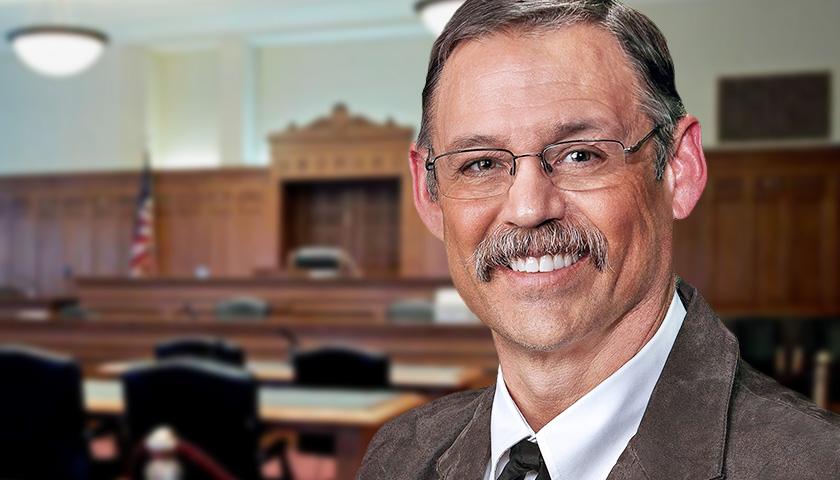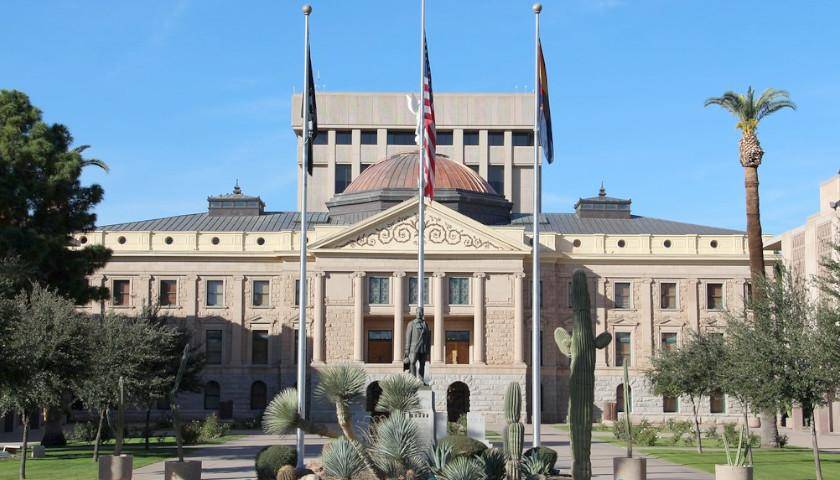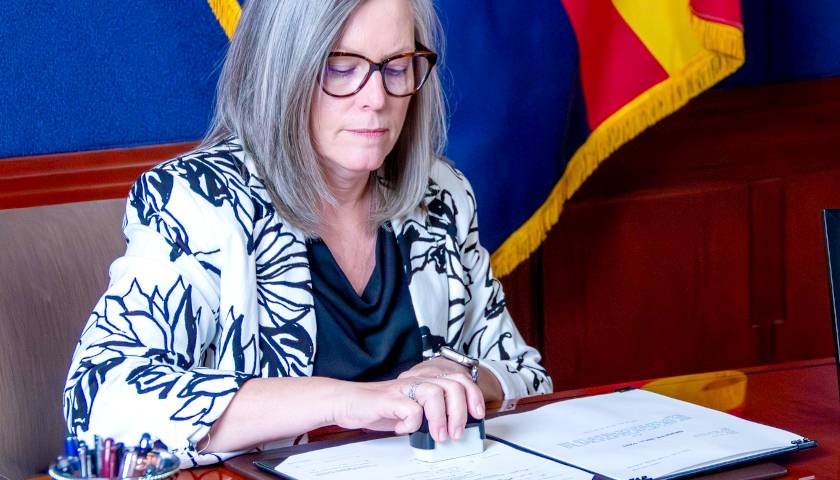Three of the Trump-endorsed candidates in Arizona who lost their races filed lawsuits contesting the election results. Gubernatorial candidate Kari Lake, attorney general candidate Abe Hamadeh, and secretary of state candidate Mark Finchem all filed lawsuits on Friday.
Finchem’s complaint, which was filed jointly in Maricopa County Superior Court with Jeff Zink, a Republican candidate who lost his race challenging Rep. Ruben Gallego (D-AZ-07), named Gallego, Secretary of State Katie Hobbs, who was declared the gubernatorial winner over Lake, and incoming-Secretary of State Adrian Fontes, who defeated Finchem, as defendants.
Zink was later dropped from the complaint in an amended complaint filed on Monday.
Robert Bowes, a financial professional who conducts fraud investigations and who also investigates election fraud, submitted an affidavit with the complaint stating that “at least 60,624 ballots in Maricopa County, Arizona and 19,240 ballots in Pima County, Arizona were not counted.” He cited numbers provided from officials in both counties on Nov. 10 stating how many ballots remained outstanding to be counted, but said those numbers never came in. He included screen prints and a report.
Finchem is trailing Fontes by 120,208 votes, or about 5 percent. The complaint alleged that the election problems resulted in 201,232 votes wrongly going to Fontes instead of Finchem.
The complaint stated that Hobbs said after the 2021 Arizona Senate independent ballot audit that new voting machines were necessary, but she never replaced them. After some county officials called for a hand count of the election, Hobbs threatened them with felony criminal charges if they failed to certify the “defective election process.” Cochise County had delayed certification in order to hear testimony from compliance experts on the voting test lab accreditation. Mohave County Supervisor Ron Gould said he was forced to certify due to threats of being arrested. The complaint also cited Hobbs aggressively asking the attorney general to do something about the dissenting counties.
The complaint argued that the election should not have been certified since there was “reasonable evidence that the electoral system in their county was seriously defective.” They pointed out what they saw as hypocrisy, “Hobbs’ own political party, on a national platform vociferously decries the ‘every vote must be counted.’”
The complaint cited Hobbs’ interference with Twitter to get tweets removed. A representative from her office wanted the social media giant to take down tweets which stated that Arizona’s voter registration system was owned and operated by foreign actors. Going through the Center for Internet Security (CIS), a nonprofit that acts as a mediator between government entities and social media companies, Hobbs’ office was able to get them deleted.
Next, the complaint referenced Twitter suspending Finchem’s account on Oct. 31. “On information and belief the suspension was directly caused by Hobbs’ illicit censoring of her constituents in concert with Twitter.”
The complaint accused Hobbs of misconduct by an election official, which is grounds to ask for a new election. It said Hobbs should have recused herself. “Secretary Hobbs’ actions to threaten arrest of the Mojave County Board of Supervisors, sue and threatened the Cochise County Board of Supervisors with a criminal investigation and prosecution, as a very senior representative of Arizona government, directed Twitter to censor Twitter posts made by her constituent, and failing to recuse herself from overseeing the gubernatorial election in which she herself was a candidate — was all self-dealing.”
The complaint criticized the tabulation machine failures on Election Day which disproportionately affected Republicans, citing problems with the certifications. “Plaintiffs allege this total is undependable and inaccurate because the electronic ballot tabulation machines were not certified and could not be certified as the laboratory engaged to do so was itself not certified,” the complaint stated.
The lawsuit included testimony from Michael Schafer, an expert on the certification of voting labs by the Electoral Assistance Commission. Schafer highlighted problems with the certifications, such as the wrong person signing the accreditation certificate. The complaint asserted, “She negligently or intentionally failed in that duty by not properly investigating the re-certification of both the certifying labs and the lab’s certification of the computer automated voting systems.”
State law requires voting machines to be in compliance with the Help America Vote Act of 2002, and “tested and approved by a laboratory that is accredited pursuant to the Help America Vote Act of 2002.” Arizona Corporation Commission Jim O’Connor and a group of activists unsuccessfully sought to halt the use of the machines during the election.
If the voting machines had been “properly vetted and inspected the machines would have run properly,” the complaint stated. Hobbs’ universal launch of the new vote center process at every location instead of incrementally was cited, as well as changing the paper gauge without adequately testing it first. The reason the voting machine tabulators apparently malfunctioned is because they weren’t recognizing the paper being fed in, perhaps due to the gauge or the graphics being printed out at a different resolution.
The exhibits included an affidavit from an election worker at the polls who discussed many of the problems, including poll workers telling voters incorrect information, failing to count the misread ballots, and placing them in bags with ballots that had already been counted. The complaint also included an affidavit from Mark Sonnenklar, a roving GOP attorney who compiled observations from himself and other attorney observers. They observed voters getting frustrated and leaving the vote centers without voting and poll workers failing to give voters the proper instructions on what to do if their vote would not tabulate.
For relief, Finchem asked to inspect the mail-in ballots, the envelopes with signatures, and any duplicate ballots created from the originals. He wants the court to set aside the election and either declare him the winner or conduct a new statewide election without voting machines and mail-in ballots under the supervision of a special master appointed by the court.
A hearing was held Tuesday at 10:30 a.m. in Maricopa County Superior Court. Maricopa County Superior Court Judge Melissa Julian scheduled time Friday morning for oral arguments on the defendants’ motions to dismiss, and said an evidentiary hearing on the case could be possible next week if the case is not dismissed.
UPDATE: Judge is now Judge Melissa Julian. Hearing was held today. Zink is no longer part of the case. Schedule was set. Motion to dismiss hearing Friday. Evidentiary hearing Monday, may get pushed back. We are in this. 🙏#AZSOS #AZGov #Election2022 pic.twitter.com/l8JlU3vOOc
— Mark Finchem #JustFollowTheLaw VoteFinchem.com (@RealMarkFinchem) December 13, 2022
Hearings in the Lake and Hamadeh lawsuits also took place on Tuesday, with Hamadeh’s in Mojave County Superior Court.
– – –
Rachel Alexander is a reporter at The Arizona Sun Times and The Star News Network. Follow Rachel on Twitter. Email tips to [email protected].
Photo “Mark Finchem” by Mark Finchem. Background Photo “Courtroom” by Carol M. Highsmith.






[…] decision throwing out Arizona Secretary of State candidate Mark Finchem’s similar election lawsuit and came to a similar conclusion, calling the judge’s reasoning “absolute […]
[…] the decision throwing out Arizona secretary of state candidate Mark Finchem's similar election lawsuit and came to a similar conclusion, calling the judge's reasoning "absolute […]
[…] previously reported by The Arizona Sun Times, Finchem’s complaint stated that Hobbs said after the 2021 Arizona […]